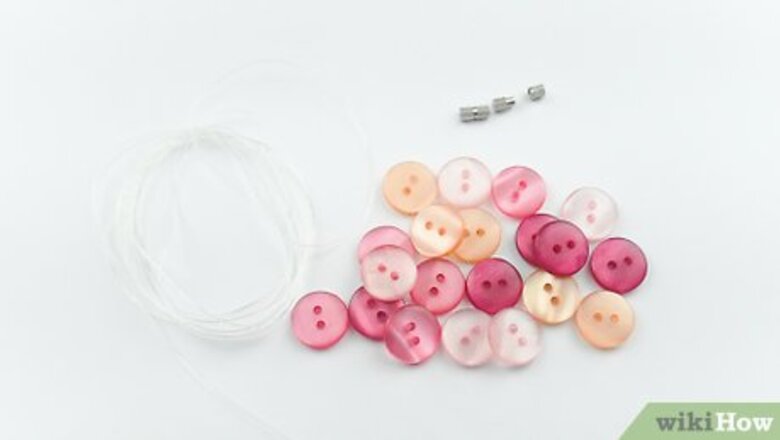
views
Casual
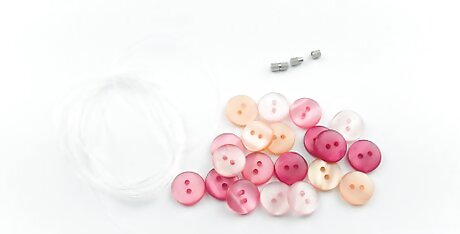
Buy supplies. You can make a fun, colorful, and casual bracelet by lacing together buttons with fishing line. Buy regular, two-hole buttons in slightly varying sizes and colors, depending on your own personal style. You will also need a length of fishing line or elastic thread, doubled up to add strength.
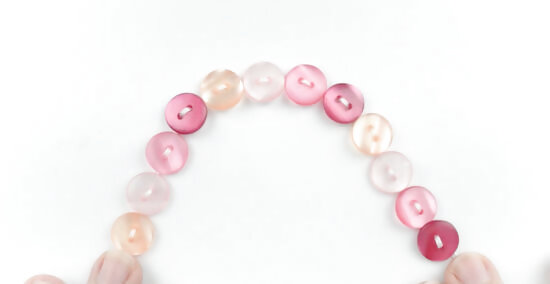
Thread the buttons. Thread the buttons together by going up through the right hole and then down through the left. Take the next button and thread the string down through the right hole and up through the left. The next button should be laced as the first. Continue in this way until the bracelet is long enough. You can gauge the length either by measuring your wrist beforehand or by simply trying the bracelet on occasionally through the process.
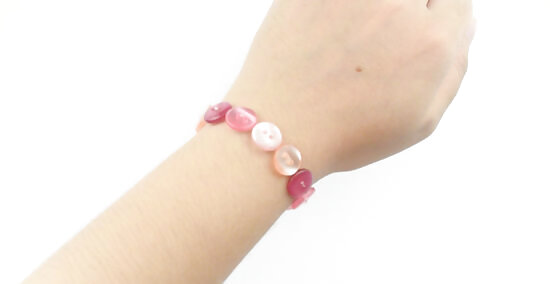
Finish the bracelet. Add the clasp of your choice and you’re done! This is a great bracelet to wear with your everyday clothing. It can add color to an outfit, as well as adding a little quirky, feminine charm.
Formal
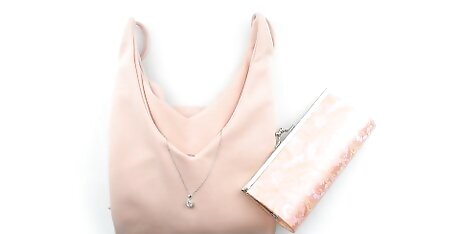
Choose your look. For a more formal look, you can make a bracelet that’s perfect for a cocktail dress and a night on the town. A stylish, elegant look can be created with a simple string of circular beads. This will give you the string of pearls look without the string of pearls price.
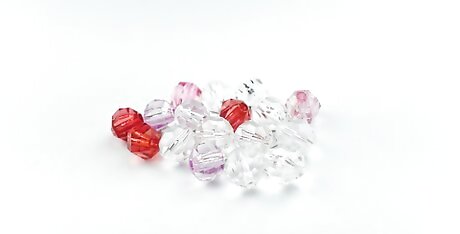
Buy your beads. Depending on your style and preference, look for either metal, pearl, or imitation pearl beads. They should be roughly pea-sized. These should be simple. Try not to use more than three colors and be sure that the colors you use are similar. You may wish to get the beads in a few slightly different sizes. Use them in a random or semi-random pattern to give your bracelet a little variation. You may also want to get very small beads to put in between the larger ones. These act as spacers and can create a slightly different look, as well as making your bracelet more flexible.
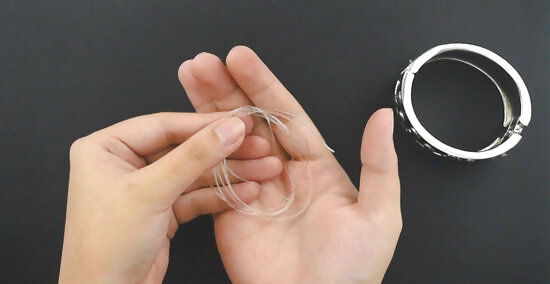
Find string. Next get fishing line or strong thread. Elastic strings can also be used if you do not want your bracelet to have a clasp. This will be used to string the beads together. It may be possible to use ribbon and do a bow closure, but this will depend on the size of your beads and their center holes. Measure your wrist and add length depending upon how loose you would like your bracelet to fit. You can also gauge length by measuring other bracelets you have. Be sure to leave an extra at the ends, to attach the clasp if you wish to have one or to tie the elastic strings if you do not. Any unnecessary thread will be cut later.
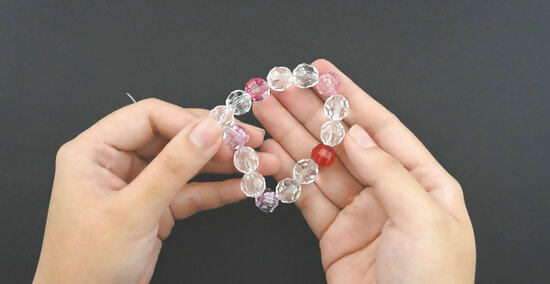
String the beads onto the thread that you have chosen. Arrange them how you feel it looks best. Attach the clasp you have chose to use, using the method recommended on its packaging. Trim extra threads and you’re done!
Kid-Friendly
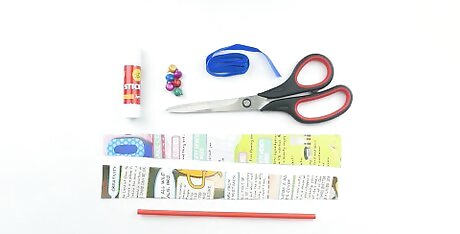
Get materials. You will need ribbon, plastic beads, straws, wrapping paper, glue, and scissors. Choose the specifics of the beads, paper, and ribbon according to your style. Try to get colors which match well together and fit your child’s personality.
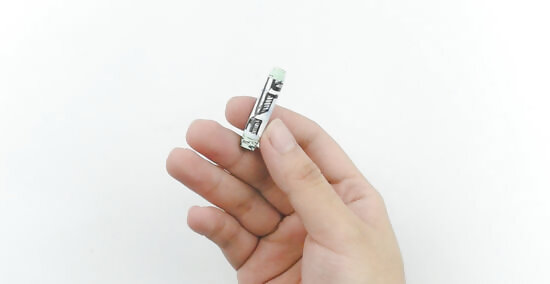
Make the beads. You will make the beads by covering the straw in the wrapping paper. This will be something that the child can do largely unaided, if they are old enough. These straw beads will be more cost effective than glass beads and also safer for the child to wear. Begin by cutting the paper into small triangles, perhaps an inch to an inch and a half across the long side. Brush glue onto the backside of the paper and then roll the paper onto the straw. Cut off the section that is now covered in the paper to form the bead.
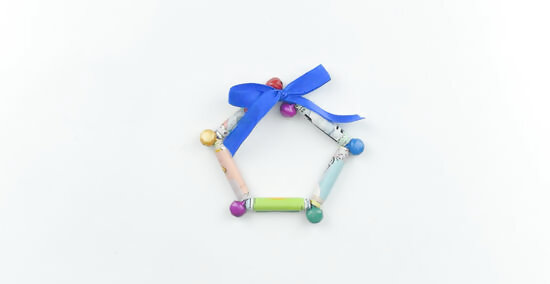
String the bracelet. Alternate the straw beads with the plastic beads and then tie the ribbon in a bow to create the closer. You’re done! This is a great project to do with your child as it will allow them to express their creativity while practicing hand-eye coordination as well as other important skills.
Men’s
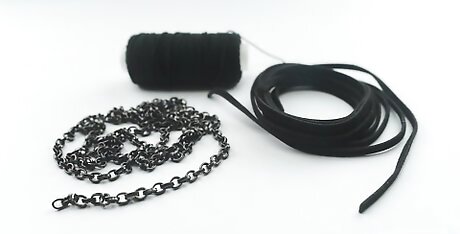
Stay simple. Men tend to prefer simple looks using masculine materials. Use materials like leather and metal, and wooden or glass beads as opposed to colorful plastics. Avoid bright colors and ribbons. If, however, you know that the man in your life would prefer something different, go with what you know they would like.
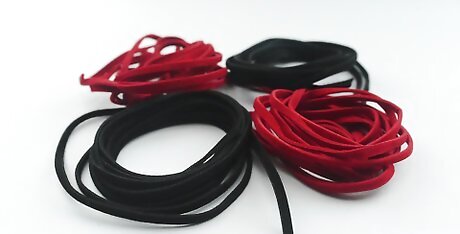
Leather braid. An easy style to try would be a simple leather braid. Begin by purchasing leather strings in whichever color you prefer. You may even get a variety of colors and mix them. These string should appear even and not be too wide, as this will make them easier to braid. You will also want to ensure that the leather is strong. It should not be too thin, like the leather used to line clothing. You do not need to get real leather. If you object to the use of animal products, faux leather can be easily purchased to create the same look.
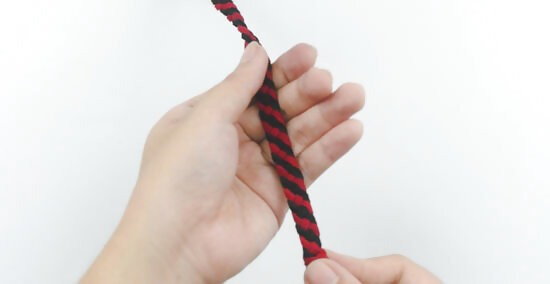
Braid the strings. Braid the strings in as complex or simple a pattern as you wish. You can do a standard braid or you can look up more complex braiding in either a book or on the internet. Try a French sennit or various Celtic knotting techniques. Weave until you have reached the desired length.
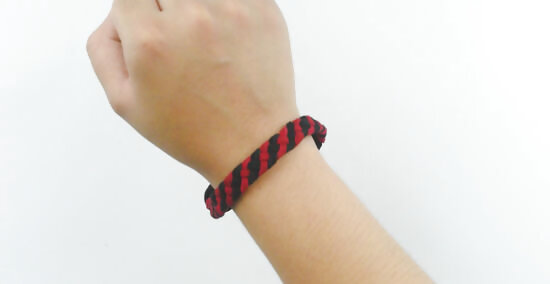
Make the clasp. Finish by creating a toggle clasp by knotting one end of the extra strings and creating a loop with the other. Be sure that the knot is small enough to fit through the loop but not so small that it comes out too easily. A little extra string coming from the knot can help ensure that the clasp will stay closed. Alternatively, the ends can simply be tied. You’re done!
Ideas and Supplies
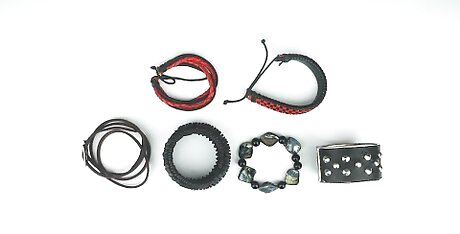
Get ideas. Before you begin making your bracelets, think about what you want to make. Knowing what you want to do will make you better prepared, ensuring that you don’t waste time and supplies on something that you don’t really want as well as allowing you to make a better-looking final product. Look at your own collection. Look at your own bracelets, purchased or made by others. You can recreate or take ideas from aspects of pieces you already own and like. Maybe you like a particular type of bead or clasp or color. You will also want to look at your own collection to decide if there is a type of bracelet that you might need. Look for holes in your collection, such as a lack of casual bracelets for everyday use, and think about what you can make to fill that need. Look at what others have. You can similarly get ideas from bracelets that you see on other people. Does your best friend have a bracelet that you absolutely love? Try to recreate the qualities that you like about the bracelet so that you too can have the look. You can also look to fashion magazines and celebrities for inspiration. Browse local jewelry stores. Go to stores that specialize in jewelry, like Claire’s, or larger stores with jewelry departments, like Macy’s, to get ideas about what you might want to make. The wide selection in stores like these will allow you to get more ideas, as well as helping you stay at the front of fashion trends. Browse the internet. The internet is a great place to look for crafting ideas. Websites like Pinterest allow you to not only collect ideas but also find brand new ones through the lists that others have created. You can search by looking for just bracelets or you can also try to search by style, color, or materials. The internet can be useful because you can often find ideas as well as instructions.
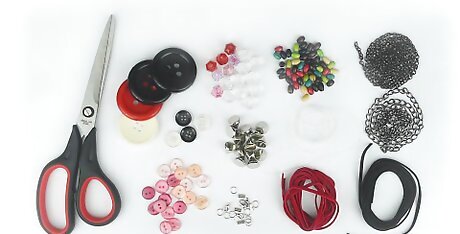
Gather supplies. In order to make your bracelet you will need supplies. These can be simple and inexpensive or they can be elaborate and more costly. It depends on your personal preference, as well as your needs. Supplies are easily acquired from a variety of locations. Craft stores. You can find a wealth of supplies from local craft stores. Bead stores specifically, if you have one nearby, will have supplies just for making bracelets. A wide variety of options should be available, as well as a staff to advise you on needed supplies and techniques. Craft stores will also often offer classes and other resources, so be sure to ask about what is available to you or join their mailing list for announcements. Thrift stores and vintage shops. You can purchase older items to upcycle into a brand new bracelet with a vintage feel. Try stores like Goodwill or local vintage or resale shops. You can use old earrings to make charms or reuse beads from necklaces and bracelets. Upcycling like this is environmentally friendly, by helping to reduce waste, as well as being very cost-effective. Farmer’s Markets and local artists. Try farmer’s markets to see what local artists in your area are creating. You may find bead-makers with beautiful work, perfect for your next project. You can also find local artisans though nearby art shops or on the internet. Buying from artists such as these will help support your local economy, as well as supporting local arts and crafting culture.
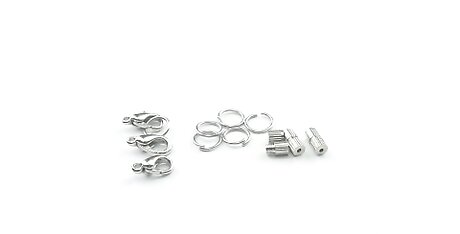
Buy your clasp. No matter what type or style of bracelet you are making, the clasps will largely be the same as they are based more on preference. Go to a craft or bead store and buy whichever type of clasp you prefer. Keep in mind how you will be able to attach it to the string to ensure that the clasp will work with your project. Simple clasps, such as a toggle or hook and eye, might be better if you want to be able to get the bracelet on and off quickly or if you prefer a more artistic look. Lobster claw clasps tend to be the most popular clasps on jewelry in recent years. They are simpler to use and very secure, which will help ensure that you do not lose your bracelet. Barrel clasps, which screw together, tend to be more common on children’s jewelry. This is because they are strong and secure but require less coordination and dexterity to put on than some other clasps. They are, however, better suited to necklaces than bracelets. Bows and ties. Another option is to use the thread itself as a clasp, by leaving it long and tying a bow to keep the bracelet closed. This can be done by using a ribbon to build your bracelet or with other materials like raffia or coarse string. It is important to note that thicker or wider string is necessary for this type of closure, as thinner strings will easily break or come undone.














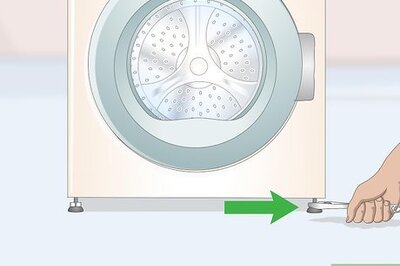




Comments
0 comment